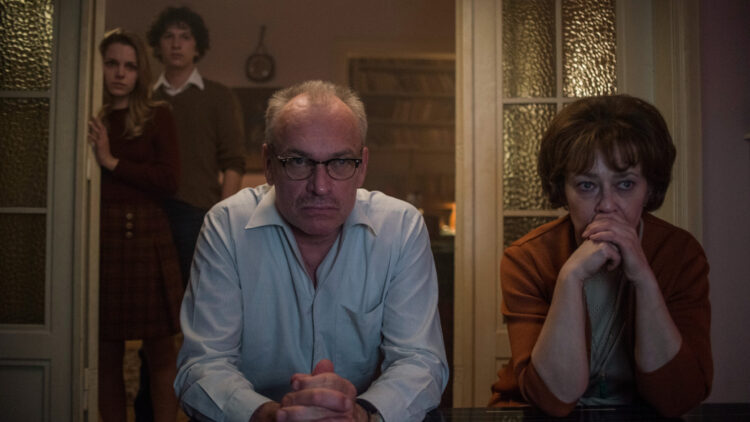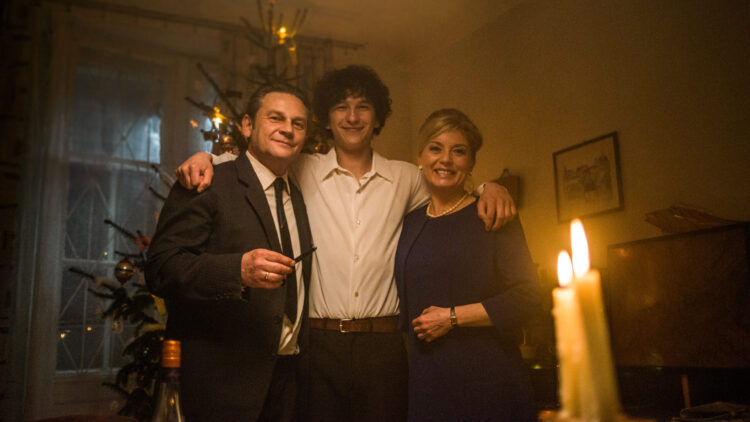Krzysztof Lang, the director of March 1968, dedicates his empathetic and powerful film to old Jewish school friends who were compelled to leave Poland after the Polish communist regime launched an anti-Zionist campaign reeking of antisemitism.
At least 15,000 Poles of Jewish descent emigrated in 1967 and 1968, having been falsely tarred as rootless cosmopolitans who were disloyal to their homeland.
These were absurd accusations, since these highly assimilated and patriotic Jews considered themselves Poles above all else. In retrospect, they were the victims of university student protests that rattled the government, a power struggle within the Polish Communist Party, and Israel’s stunning victory over Soviet-backed Arab countries in the 1967 Six Day War. These events converge in a toxic brew of chauvinism, xenophobia, subservience to Moscow and plain old antisemitism.
Lang’s movie, which will be screened at the New York Jewish Film Festival on January 16 and 17, focuses on two families in Warsaw who were affected by these developments and whose lives intersected as turmoil gripped Poland.
Jerzy Bielski (Mariusz Bonaszewski), a Jewish doctor, is dismissed from his position in a hospital, plunging his Catholic wife and their adult daughter, Hania (Vanessa Aleksander), into despair.

Roman Wolicki (Ireneusz Czop), a colonel in the Ministry of Interior, scours files and discovers that Bielski’s birth name is Aron Gutman, and that he attended a party celebrating Israel’s military triumph over Syria and Egypt, both of which are client states of the Soviet Union, which imposed communism on Poland following World War II and still maintains an iron grip on it. Wolicki’s son, Janek (Ignacy Liss), who’s studying engineering at a technical university, is dating Hania, a drama student.
When the film begins, Hania and Janek do not know each other. They meet after attending a theater production of Dziady, a renowned play by Adam Mickiewicz, the Polish Shakespeare, that the authorities deem subversive and politically explosive. As it unfolds on a darkened stage, the camera pans on dour and disapproving government officials in the audience.

“How could the censors pass it?” a student wonders later on.
In a subsequent scene, Bielski listens intently to radio broadcasts reporting that the Polish-Israeli Friendship Society will probably be dissolved, and that a new wave of persecution is washing over the last remaining Jews of Poland, who feel Polish to their fingertips and have adopted the rituals and holidays of their fellow citizens. The Bielskis, for example, celebrate Christmas with a Christmas tree.
As Wolicki delves into Bielski’s file, he discovers that he escaped from the Warsaw Nazi ghetto, joined the Home Army to fight the Nazis, and Polonized his surname. Bielski certainly feels like a Pole, but in Wolicki’s jaundiced opinion, he’s little more than a Zionist and a Jew.
Janek, who’s deeply in love with Hania, learns from his mother, an ethnic Ukrainian, that Bielski was sacked on these specious grounds. “But you’re a Ukrainian,” he says. “It’s not the same,” she correctly replies.
Being an optimist, Bielski believes that this bout of nastiness will subside. His wife, having lost her job as well, disagrees with his rosy assessment and wants to emigrate. Janek learns further details from Hania, who considers Poland her homeland and cannot understand why her parents have been victimized. “They have worked for Poland all their lives,” she says, puzzled and flabbergasted by their dire situation.
When Janek brings up this sensitive matter with his parents, he claims that Bielski is not a Zionist.
At this juncture in the film, student demonstrations break out. “Independence without censorship,” they shout in a reference to the government’s decision to ban Dziady. “We want culture without censorship.” Armed with batons, the cops beat the students. Krzysztof, in an interesting twist, mixes old black-and-white clips of the protests with his own colored footage.
The demonstrations reach a climax of intensity in March 1968, when students chanting slogans ranging from “Down with censorship” to “Democracy and freedom” are met by aggressive pro-regime workers likening them to Judas.
Inevitably, Janek and Hania get caught up in the protests, much to their detriment. Janek is smashed in the face by a policeman, while Hania is arrested. Thanks to his father’s clout, he’s released. Hania is accused of being an Israeli and an American spy.
In file footage, Polish leader Wladyslaw Gomulka claims that the student protest leaders are of “Jewish descent,” and that “this category of Jews” is welcome to leave Poland. He receives a thunderous round of applause.

Hania is expelled from college, summoned to the Ministry of Interior, and ordered to leave Poland within three weeks. Janek is heartbroken, but he comes to terms with reality.
His father pays a price, too, after his boss reprimands him for his son’s anti-establishment behavior and his friendship with the “Jewish bitch.”
March 1968 skillfully recreates a time and a place that is deeply embedded in the consciousness of Poles and Jews who witnessed a travesty of justice.
